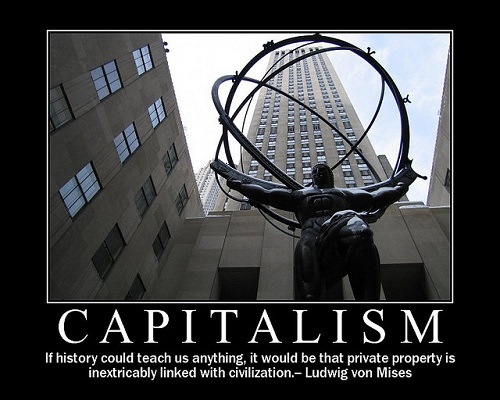Difference Between Capitalism And Imperialism
Capitalism
Capitalism is an economic system that encourages individuals to engage in economic activities in different capacities within the existing legal and institutional framework. The elements of production such as raw materials, machines and labor are owned and managed privately with limited state interference. The purchase and sale of goods are done by the owners at their will.
Private motive is the biggest driving force behind the functioning of capitalist system. It prompts the owners to produce more and workers to work more to maximize their gain. The price mechanism is not controlled by any regulatory body but by the consumers’ choices. If the prices are high, producers gain more profit. But since the consumers are free to buy any quantity of goods, subject to their degree of satisfaction, producers have to cater for their tastes to satisfy them. If the consumers are not happy with the price of a product, producers will be compelled to bring down its price. That is why it is said that in a capitalist economy, ‘consumer is the king’.
Competition is also a major feature of capitalism that determines the production, distribution and consumption of goods. Individual buyers and sellers can not influence the market decisions. Flexible prices adapt themselves to the changes in demand and influence supply accordingly.
Finally, since producers own and manage their enterprise, they feel enthused to improve production and increase productivity. Increase in productivity results in rise in quality, fall in prices that leads to rise in consumption and prosperity of the country.
Imperialism
Imperialism, on the other hand, is a concept of extending a country’s power and influence through colonization, use of military force or other means. Imperialism is of many types – political, economic and cultural. However, some scholars define imperialism as any system of domination imposed upon a country against the will of its people by another.
Imperialism can be ‘formal’ which means complete colonial rule. It can also be ‘informal’ which means indirect but strong dominance established by a country over another through technological and economic superiority, forcing the latter to accept debts or trade agreements on unequal terms leading to its subjugation. There is no physical occupation of territory in such cases.
Among the major imperialist countries which changed the shape of history are Great Britain, France, Germany, Japan and Soviet Union. Some believe that imperialism has an idealist aspect. Superior technology and advanced economic management of the imperialists often improve the economies of the subjugated countries.
Relationship with capitalism
There is a relationship between imperialism and capitalism in the sense that imperialism serves the political interests of the capitalists. To Vladimir Lenin, imperialism is the natural extension of capitalism. According to him, capitalist economies need expansion of investment, manpower and material resources for profitable employment of surplus capital. Otherwise, they will face destruction of capital and economic crises. It is this need for expansion that motivates imperialist ventures.
Imperialism has its cultural form which influences a country’s moral, social and cultural mores. It not only changes the tastes and lifestyle of its people but also changes their approach to life. The underlying messages of the films, dramas and TV shows often motivate people to break away from the barriers of traditional beliefs. People of many Asian and African countries have taken to foreign goods after being influenced by persistent Ad campaigns. It follows that cultural imperialism is also a part of the capitalists’ design to explore new buyers of products manufactured by them.
- Difference Between Bharatanatyam And Odissi - February 22, 2016
- Difference Between Socialist And Democrat - January 11, 2016
- Difference Between Capitalism And Imperialism - January 11, 2016
Search DifferenceBetween.net :
4 Comments
Leave a Response
References :
[0]https://en.wikipedia.org/wiki/Imperialism
[1]http://www.preservearticles.com/2012031326960/what-are-the-various-features-of-capitalism.html
[2]https://www.flickr.com/photos/heroiclife/223477228


All of the “isims” are the same, the few controls the masses to destroy for their gains!!!
Well I agree and also disagree with Lenin in some way, since a nation or a particular space itself is fragmented and thus an imperialist, based on power of a hegemonic discourse, power is always there exchanging one member with another. For the material reality of colonised countries, which is more than half the world, exhibits that the despair is rather formidable and so is anger born out of almost complete subjugation by an invisible westernized monarch. Imperalism and capitalism thus, which I agree with Lenin, should both be used since both are lovers of each other in Era of globalism. The Marxist discourse, fetishizing capitalist term which is predominant, seeks to evade the evils done by the speaking subject on the behalf of his history and his system. The world is subjugated to nincompoops and half educated Westernized scholars. Lol
“To Vladimir Lenin, imperialism is the natural extension of capitalism”
An imperialistic Communist dictator, no less.
You should read about Lenin before
making uneducated judgements.